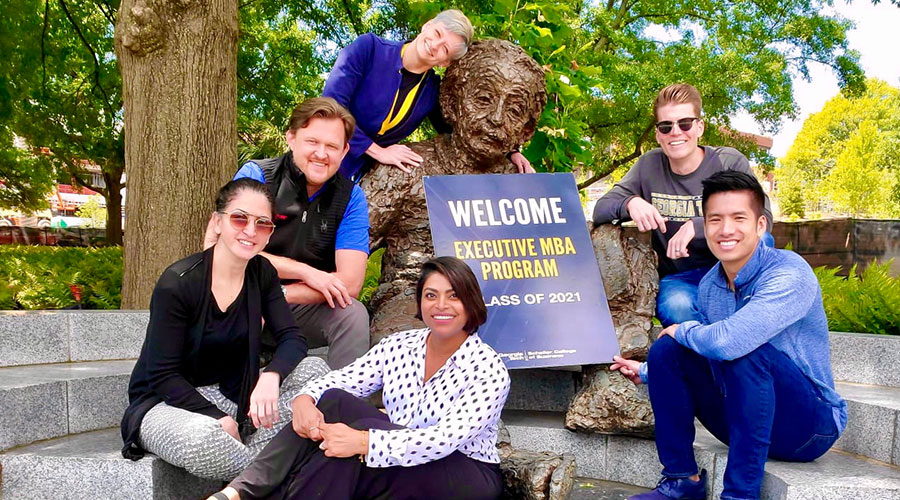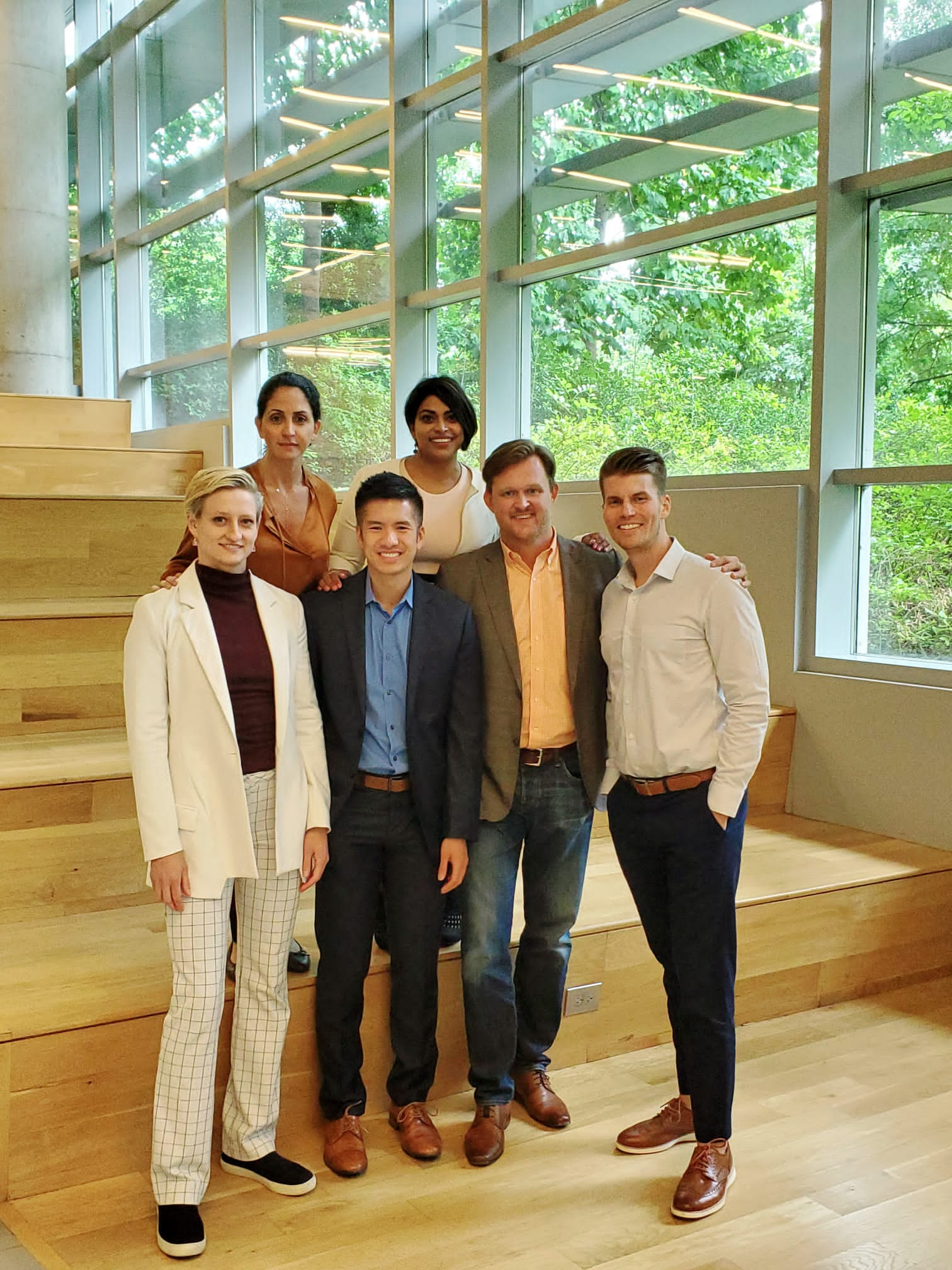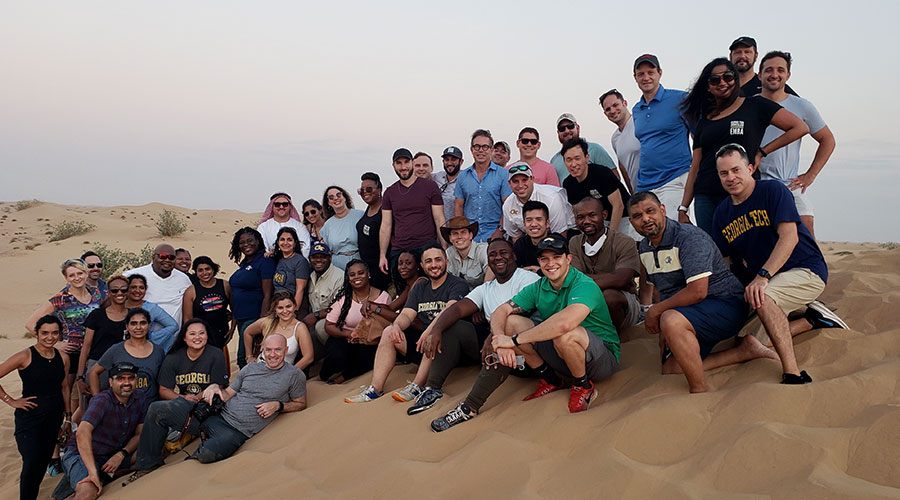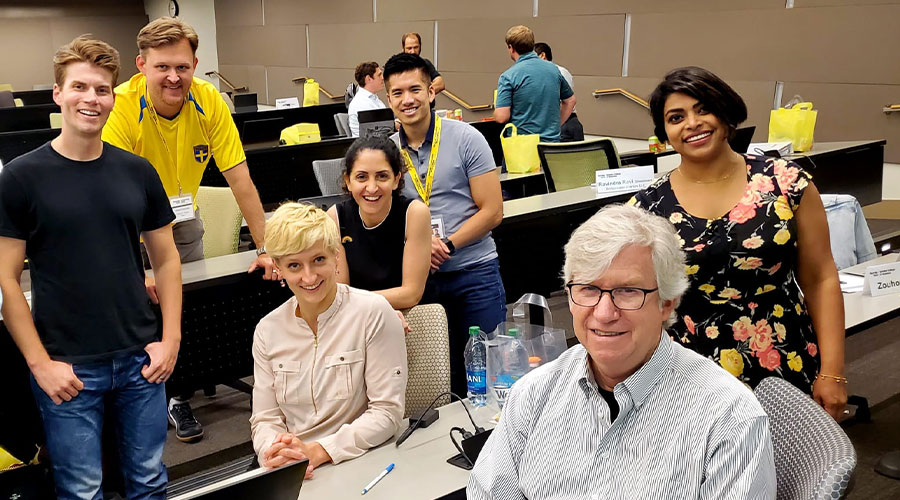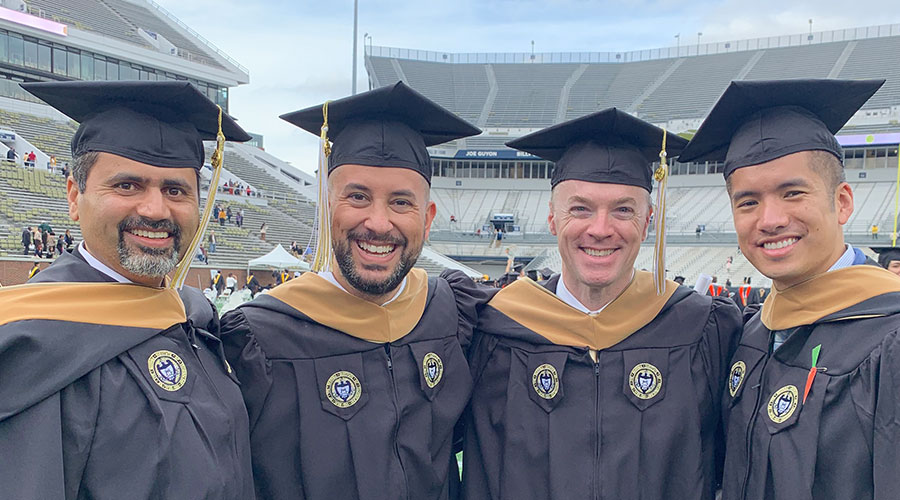When Phong Truong was an undergraduate student at Georgia Tech, he visited Delta Air Lines for the first time and began envisioning a future career at the company. His dream became a reality when he was hired as an aerospace engineer after graduating in 2010. He rose through the ranks working on aircraft maintenance programs. But after more than a decade at the world’s busiest airport, Phong was ready to spread his wings and soar to his next opportunity.
He always wanted to earn his MBA directly after graduating, but realized he didn’t have enough work experience when considering the program earlier in his career.
The timing became right in 2020. One of Phong’s friends, who also worked at Delta, was pursuing his MBA, inspiring him to reconsider that path. The decision was easy for Phong to return to his alma mater, and he also liked the curriculum of the Georgia Tech Executive MBA program compared to other top-ranked business schools.
Phong joined Scheller’s Executive MBA program in 2020 and became a Double Jacket the following year after graduating with his Executive MBA in Management of Technology. The 17-month program was a life-changing experience for Phong. He formed life-long friendships, improved his time management skills, and found his next dream job.
Phong didn’t intend to switch industries when he joined the Executive MBA program. However, his cohort inspired him to explore other professions. “My classmates helped me understand what the culture and career progression is like in other industries,” he said.
Phong found valuable insights in those conversations, but he knew he needed help tailoring his resume from engineering to be more tech focused. He sought assistance from Cynthia Lynch, director of Executive MBA student engagement at the time, to help him revamp his resume. With her guidance, he rebranded and translated his skills to where he wanted to go.
“After graduating with my Executive MBA in December 2021, I realized that pivoting into a completely different role and industry would need more than just a degree,” he said. “I needed additional work experience too, so I took a more indirect path through a lateral position transfer at Delta, which helped me translate my skills into tech.”
Phong's lateral move at Delta was from lead principal engineer of Cabin Maintenance Programs to Techops supply chain manager, where he transitioned from an operational, engineering-focused role to a more strategic, commercially focused role. The valuable experience he learned in contract management and commercial negotiations helped shape his skills to be more transferable to consider pivoting to a new industry outside of the airline industry.
While in the Executive MBA program, he applied to tech-focused roles and interviewed at some of the Magnificent Seven companies. Although the interview process was long at some companies, Phong was fully prepared when he interviewed at Google. He applied some of the lessons learned from his cohort and previous interview and was excited when he was offered the program manager of networking operation at Google in early 2023. He secured his second dream job.
Now, Phong spends his days working in networking commercial and business operations. He is a financial data governance lead within Google Cloud and supports the business operations for many product areas that support the expansion of the cloud infrastructure around the world. He says pivoting into data isn’t entirely new. He has data analytics experience working with aircraft reliability data as a lead engineer at Delta and eventually translated his engineering skills to his current role.
“If you’re looking to switch jobs or careers, your path may not be well-defined,” he said. “You have to keep your mind open because opportunities may come at any moment, and you have to be open and flexible.”
We talked with Phong to learn more about his Executive MBA journey, the value of his cohort, and switching careers.
How did you know Scheller was the best option for your career aspirations?
I was ready to challenge myself and be open to new opportunities; I wanted to unlock my potential. I chose Scheller because of its focus on a technology-focused curriculum. Working in Big Tech was a long-term goal, and I didn’t have sufficient transferrable skills to pivot to the industry before I started the Executive MBA program. I knew I needed the extra edge to put me over the top. Attending the orientation session and seeing students talking about their capstone project they recently completed got me excited about the program.
What were your expectations going into the program?
I was excited! Going back to school reinvigorated me. When you’re in a work setting, you’re focused on meeting your divisional goals to support your company. But with school, I put the work phone down, emails aside, and dedicated myself to expanding my knowledge.
Why did you decide to choose the Management of Technology specialization?
One of the things I liked about the Global Business specialization was that students worked on a project with a local Fortune 500 company in Atlanta. But I chose the Management of Technology track because of its technology and start-up-focused curriculum, which aligned with my future career aspirations.
What was your cohort experience like and the connections you formed with your classmates?
I still talk to my team members on my capstone team and a few others from my 2021 cohort. We have a group chat and have met up several times since graduation. We’ve returned to Tech to participate in two Georgia Tech Pi Miles. It’s been great to build that network and also friendships. The Executive MBA program motivated me to continuously network, where that wasn’t a focus earlier in my career.
How did you balance work, personal, and school and going through the pandemic?
My first semester in Fall 2020 and second semester in Spring 2021 were hybrid. I preferred the in-person classes versus virtual because it was important for me to connect with my classmates and professors and get the full experience as if I were back in undergrad. At the same time, I juggled my full-time job as an engineer at Delta, which taught me extreme task management. Managing my time helped me refocus my personal and work life and focus on what matters. During the 17-month program, you don’t have time to do a lot of non-value-added things, unfortunately.
When did you realize you were learning new transferable skills and wanted to make an industry pivot?
Networking with my cohort helped me understand the ins and outs of other areas of expertise outside of my industry. I think the strength of the network and the MBA program helped me a lot. The career sessions I had with Cynthia Lynch before she retired helped as well. She helped me reshape my resume and how I was selling myself so that I could better position myself as a suitable candidate for my next role.
Were you nervous or excited about switching industries from engineering to business?
Both. I spent my entire career with Delta Air Lines — almost 14 years. Jumping into a new company and industry was nerve-wracking because it was almost like the first day on the job after college. You’re starting with a new network at work. I experienced some imposter syndrome. But I was excited because Google has always been one of my dream companies, and Delta was the other one. I never knew I had the skill set to make a switch, and the Executive MBA program helped show me that I did have those transferrable skills.
You participated in the Lean Six Sigma training that is offered to Executive MBA students. What was that experience like? How do you implement what you learned into your career?
I highly recommend the Lean Six Sigma (LSS) Green Belt program because it is a free course offered by the Executive MBA program. LSS is a methodology that I used previously in my work experience at Delta in improving processes and reducing errors in aircraft maintenance programs. I also use it in my personal life to improve routine tasks such as organizing a garage or changing the oil on my car.
How has your view on leadership and technology changed since graduating from the program?
I think it’s constantly evolving. Experiencing and studying different leadership styles at companies has changed my mindset since I received my MBA. However, I see similarities between the two companies in that they both lead with empathy. That’s the best leadership trait of Ed Bastian and Sundar Pichai.
Thinking back from your first day of class to your last day, is there anything you would change?
I am naturally a motivated and driven person, so being completely focused on achievement was top of mind. However, if I were to go through the program again, I’d have a more relaxed view and enjoy the classroom discussions without stressing out over grades (there are still exams however).
What advice do you have for prospective students who want to pursue their Executive MBA?
I have two pieces of advice. I wouldn’t start the program until you’ve had five to 10 years of work experience so you can bring your experiences and relevant examples to the class to share. Then, you can apply the lessons from class to your everyday work and maybe to a different role.
My other advice is to come to class and be ready to listen to your classmates. You should absorb all the knowledge from people outside your industry and functional role and understand what’s out there. You never know where you will end up. I didn’t think I would work at Google or in the tech industry, but that’s where I am now. Be open in your career mindset.

